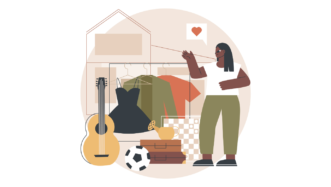LESSON OVERVIEW
The main objectives of this speaking lesson on generations are to:
- talk about differences among generations;
- compare their experiences with what’s shown in a short comedy video.
In this lesson, students identify and discuss stereotypes related to different generations. They talk about people they know and think about situations different generations would most likely relate to. Students also watch a comedy video on how generations behave at work and imagine how the youngest generation will behave in different areas of life.
B1 / Intermediate45 min
60 minSpeaking ClassUnlimited Plan
This is a Speaking Class worksheet. It includes a variety of tasks that let your students practise their speaking skills. This lesson format does not focus on grammar or vocabulary. Learn more about it here.
WARM-UP AND REFLECTION
This speaking lesson on generations starts with a warm-up in which students complete statements with the phrases (e.g. future generations, generation gaps, older generations, etc.). They also share if they agree with the statements. After that, students think about and describe people they know from different generations (baby boomers, Generation X, millennials and Generation Z) in one sentence (e.g. My mum is a baby boomer. She’s really organized and she likes meeting new people.). Then, students read the statements with various opinions and decide which generation might say them.
VIDEO AND DISCUSSION
In this part of the lesson, students discuss questions about stereotypes related to different generations including the one about their attitude to work. Then, they watch a comedy video about how different generations behave at work and compare their ideas. After that, students discuss the behaviour of different generations depicted in the video by answering questions. Then, they look at the activities (e.g. throw a surprise party, start a social media account, etc.) and say which generation would be the worst and the best to do them with and explain their choice. This speaking lesson on generations ends with an activity in which students think about the youngest generation (Generation Alpha, born 2013 onwards) and imagine what they will think about and how they will behave in different areas of life (e.g. family, work, technology, etc.).
Subscribe to unlock these and many other Standalone lesson lesson plans with the Unlimited planWORKSHEETS













I love this lesson! Super engaging topic.
Thanks a lot!
That’s great! Thanks for your feedback 🙂
Is there a way to make this lesson plan more for upper and advanced level students? Thanks very much in advance.
Hello! Have you seen our B2 lesson on generations?
Hi Olia,
Yes, I have used it but wanted to adapt the previous lesson plan as I teach upper and advanced level. Thanks!
Troy
Oh I see! Unfortunately, we don’t adapt lessons for different levels. However, I think this one can be used with more advanced students. You can encourage them to use more advanced vocabulary in discussions. Also, if you use e-lessons, you can make your own copy and make any changes you think are necessary 🙂
Thanks for the great lesson plan. It definitely made my student talk! 🙂
Thanks, I’m glad you like it 🙂